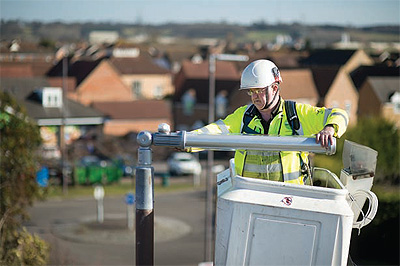Advancing Highways Management and Maintenance: The Role of HTMA
Champion of the road
Representing the UK highways management and maintenance sector for more than a decade, the Highways Term Maintenance Association provides an influencing voice to industry operators and policy markers
“HTMA is the trade organisation representing service providers that currently oversees more than 85 per cent of the highway network within the UK. Its members are some of the best-known  consulting engineers, construction companies and service providers across the nation and each represents a vital element within the community, while working together to maintain the basic infrastructure needed to underpin a fast-moving and flexible economy,” elaborates HTMA Chairman and Colas Limited CEO, Lee Rushbrooke. “Through the implementation of a stakeholder engagement programme, strong relationships with government, clients, other highways organisations and key industry decision makers have been formed. This means that HTMA is well-placed within the industry to leverage its knowledge and experience to influence and inform important consultations and the resulting decisions.”
consulting engineers, construction companies and service providers across the nation and each represents a vital element within the community, while working together to maintain the basic infrastructure needed to underpin a fast-moving and flexible economy,” elaborates HTMA Chairman and Colas Limited CEO, Lee Rushbrooke. “Through the implementation of a stakeholder engagement programme, strong relationships with government, clients, other highways organisations and key industry decision makers have been formed. This means that HTMA is well-placed within the industry to leverage its knowledge and experience to influence and inform important consultations and the resulting decisions.”
During its history HTMA has established a strong membership, which provides a diverse range of services to the highways industry that range from maintenance and civil engineering to street lighting, routine repairs and winter gritting plus many more. Companies forming the HTMA membership generate a combined turnover of circa £3 billion, employ more than 20,000 people and maintain approximately 200,000km of the highway network across Britain.
Membership of HTMA offers industry players significant advantages in becoming part of a highly skilled and dedicated group that offers expert advice and open information sharing.
The combined strength of its membership is an important factor in the continued success of HTMA, as it allows the organisation to form working groups that address issues, which exist within the highways industry, directly. “Through the association’s working groups, a significant base of information, guidance, tools and case studies are continually developed and shared. Members are kept up-todate with current news and ongoing activities and the ways in which they are being addressed,” Lee says. “HTMA is also a member of the Highways Maintenance Efficiency Programme (HMEP) and continues to work with the Department for Transport (DfT) and senior clients, as the UK government continues to seek to improve the efficiency of the highways maintenance sector.
“There are many challenges we are all facing within the industry, but collectively and in collaboration with clients and other organisations, we are improving standards, sharing best practice and becoming more effective in our contribution to the national and local economies in which we work.
“Working with strategic clients and over 150 local authority clients is challenging due to an inconsistency in the approach toward asset management across each region. There is a wide variety of procurement models as well as differences in contract management approaches and these all add to the overall cost of maintenance. Our members seek to achieve a balance between meeting the needs of highway users, improving quality and minimising expense,” Lee details.
“The working groups each have a specific area of focus and support the delivery of the overall strategy of the Association,” he continues. “The resulting outputs from these groups are available from the HTMA website (www.htma.info) and are widely adopted by clients and transferred into the day-to-day working practices that are employed across the industry. These have included examples such as templates for TUPE transfers, risk management matrices and sustainable travel plans; tool kits for raising awareness of the career opportunities, safety tool-box talks and training DVDs; guidance documents on safety, environmental sustainability, employee health and the use of legal clauses in contracts; and collaborative projects such as price indexation with BCIS, collaborative  contracting and contract documents with HMEP.”
contracting and contract documents with HMEP.”
One of the key priorities for companies operating within the highways industry is the implementation of safe working practices across the sector. The HTMA Health Safety & Welfare working group recognises it has an important role in supporting the goal of achieving safer working conditions. “It is very difficult to deliver highway maintenance such as resurfacing carriageways, while ensuring a safe working environment for our operatives and ensuring that disruption to traffic flows and speeds is kept to a minimum,” Lee observes. “Too many deaths and injuries at traffic works are preventable and HTMA is at the forefront of initiatives to drive a step change in leadership and behaviours. We will continue to lead in the development of innovative technology to improve worker safety, examples of which include camera technology to give arly warning of vehicle incursions into work sites.”
Equally, the other HTMA working groups highlight issues within their specialist areas and collectively design solutions, alternatives, tools or guidance to address them. One example is the Service Delivery group exploring options for road space utilisation. The aim of the project will be to get the most effective outputs for when road maintenance is required, and when combined with clear communications for road users, to acknowledge and where possible, accommodate, the needs of all stakeholders.
A second example is a project from the Sustainability working group this year, that involves the development of a climate resilience risk matrix which will support decisions to mitigate the deterioration of the road surface through choice of materials best suited for the changing climate.
In addition to these, and projects by the other groups, during the next 12 months the association will work to encourage the industry to give a higher priority to issues around health and wellbeing. Recent statistics have quoted that for every one fatality due to poor safety measures that there are 100 deaths from health related causes within the industry. Employers need to invest in ensuring staff are looked after physically and mentally. The wellbeing of staff is important to attract new talent into the industry, retain existing staff and to improve the image of construction in order to ensure the sustainability of the sector.
“Retention of staff and being able to promote the industry as an attractive place in which to work, are key priorities for our members. Historically there has been a distinct lack of diversity within the industry and recently it has become evident that fewer younger people view highways maintenance as an industry of first choice in which to build a career. The image and reputation of the industry needs to change and we are working on increasing awareness of all the opportunities on offer. We need our existing workforce to feel a sense of pride in their work, when they are given the opportunities to fulfil their potential and then for them to promote and encourage others to join. That will only come from looking after their needs, recognising the changes in our environments and lifestyles and looking after the wellbeing of our staff.
“We will ensure that we represent the wide spectrum of highways maintenance providers, while making sure that we reflect our members’ views within our policy statements and key messages. We are committed to delivering an efficient, effective and sustainable highways management and maintenance industry for the social, economic and environmental benefit of the communities in which we live and work,” Lee concludes.
Highways Term Maintenance Association
Services: The leading voice of the highways term management and maintenance industry